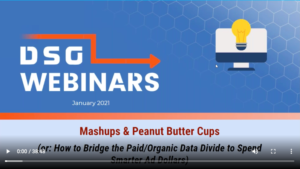Click the image to view the webinar recording
Did you miss out on DSG’s webinar Mashups & Peanut Butter Cups: How to Bridge the Paid/Organic Data Divide to Spend Smarter Ad Dollars? We’ve summarized the top 4 takeaways from the webinar so that you can catch up. There’s still a ton more content not covered here, so we encourage you to watch the full recording if you are able. You can click the picture above to view it at your convenience. Here’s what we covered at the event.
1. PPC and SEO are Unique Marketing Channels
PPC (Pay Per Click) is a method of driving internet traffic through paid search campaigns. SEO (Search Engine Optimization) aims to increase your business’s search engine rank through the use of strategic organic keywords.
PPC and SEO each have separate roles, but that doesn’t mean that they need to work independently. PPC and SEO both have a common goal: attracting people to click to your website. A holistic approach to search will help you to navigate an increasingly complex landscape.
2. Keyword Trends Can Inform Strategies
There are several strategies we can use to intertwine our SEO and PPC strategies. First, identify high ranking keywords from your organic search campaigns. Use this data to reduce or eliminate your bids on these same keywords in your PPC campaigns- especially if cost per click is high on them. If you’re already ranking high on these keywords organically, it becomes less valuable to spend your PPC budget on them.
Secondly, analyze data on your PPC click-through rates. Identify keywords with an above average PPC CTR but a low organic CTR, and then incorporate those keywords into your SEO tactics. This data indicates that these keywords are highly relevant and valuable, and should be a high priority target for your SEO strategy. This enables you to extend your digital reach without extending your marketing budget.
3. Search is Evolving
The way that we conduct searches is evolving. Users no longer search using a singular keyword, they ask questions that reveal specific needs and high intent. 70% of search queries contain 3 or more keywords, meaning your customers are searching with the intent to answer specific questions about your business. The customer may start their search on Google, but they experience a journey of before arriving at their purchasing destination. For instance, when you’re in search of tonight’s dinner, you may hypothetically start by Googling “pizza places near me”. Once you’ve discovered a contending pizza shop, you might visit their Yelp page to check out reviews, then their Facebook and Instagram to see if they’re running any special deals. Finally, you plug their name into Waze and drive to your destination. All of these platforms played a role in your purchasing decision and you may not have arrived at your end destination if the pizza shop had missing information.
For this reason, it has become more important than ever to ensure that your online presence is robust and your digital listings are complete with relevant information on your business. Today, business listings require more than just NAP information (name, address, phone number). Search, Social, Nav and voice platforms offer rich libraries of additional attributes that allow businesses to share the information that their customers are searching for. For example, businesses have the ability to specify holiday hours, pickup / drop-off / delivery capabilities, FAQs, products, menus, and so much more.
When a business’ online presence is complete with hours, reviews, photos, and relevant information like menus or product lists, consumers are 197% more likely to view that business as a place they can depend on. Proactively offering solutions to these queries helps your customers to find you.
4. Yext Offers Complete Control
Yext helps businesses publish and manage business information to the world’s largest network of Search, Social, Nav and voice platforms, including Google, Bing, Apple Maps, Yelp, Facebook, Waze and many more. On average, this network receives 2.7x more views than a typical business website. It’s capacity to house additional attributes makes Yext the perfect one stop solution for distributing detailed business information online, ensuring that your customers always have the answers that they’re searching for. Yext’s reporting infrastructure is an added bonus, offering detailed insights on where and how consumers interact with their business.
Don’t miss out on DSG’s next webinar! Follow us on social media to stay up to date on the latest DSG content.



